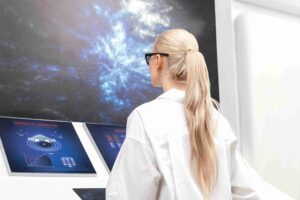Introduction
Artificial Intelligence (AI) is changing the way healthcare professionals diagnose, treat, and manage patient care. From predictive analytics to robot-assisted surgeries, AI is making healthcare more efficient and personalized.

Key Applications of AI in Healthcare
🤖 Medical Diagnosis: AI-powered tools can detect diseases like cancer and Alzheimer’s earlier than traditional methods.
🩺 Smart Wearables: Devices track real-time health metrics, alerting users to abnormalities.
📊 Predictive Healthcare Analytics: AI can forecast disease outbreaks and suggest preventive measures.
⚕ AI Chatbots: These bots assist patients by answering basic medical questions and scheduling appointments.


AI & Personalized Treatment Plans
AI helps doctors create customized treatment plans by analyzing a patient’s medical history, lifestyle, and genetics. This approach reduces trial-and-error treatments and improves recovery rates.
Challenges of AI in Healthcare
Data Privacy: AI systems collect vast amounts of patient data, requiring strong security measures.
Human Oversight: AI should complement doctors’ expertise, not replace them.
Implementation Costs: Advanced AI technologies require significant investment and training.
Conclusion
AI is reshaping modern healthcare, offering faster diagnoses, improved treatments, and better patient care. While challenges exist, the benefits of AI in medicine are undeniable, making it a crucial innovation for the future.

